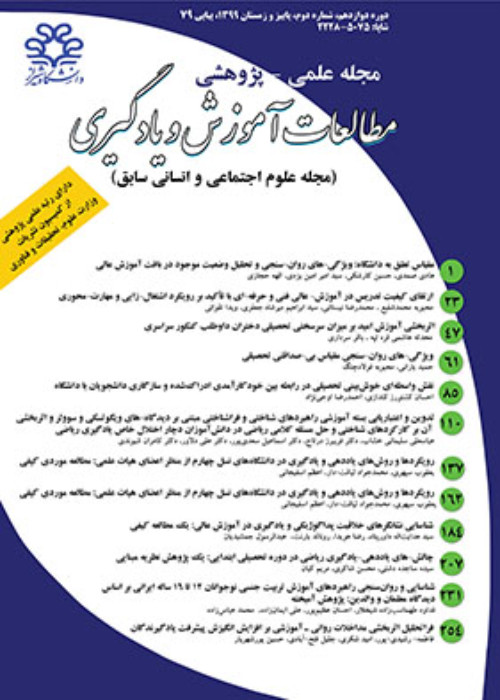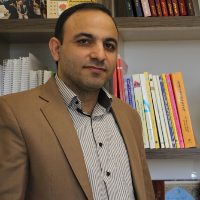An Investigation into the Relationship between Motivational strategies, Learning Strategies and Creativity with Math Achievement in Gifted Students of Esfahan
Author(s):
Abstract:
Introduction
This research aims at investigating the relationship between motivational strategies (achievement goal orientation, self-efficacy and test anxiety), learning strategies (cognitive learning strategies including rehearsal, elaboration and organization and metacognitive learning strategies including critical thinking and metacognitive self-regulation) and creativity with academic achievement of mathematics in gifted students of Isfahan. The problems of mathematics learning may come from internal individual factors or external factors. Internal problems are related to motivation and learning while the external problems are concerned with cultural, social and teaching factors. External problems can be related to achievement goals orientation, motivational strategies, cognitive learning strategies and creativity. These variables have been identified as important determinants of academic achievement.According to Elliot (1999) and Pintrich (2000a) students have four goal orientations: approach mastery goal, avoidance mastery goal, approach performance goal and avoidance performance goal. Individuals with general approach mastery goal emphasize the learning and are interested in challenging tasks. Those with avoidance mastery goal avoid the duty. On the other hand, those with approach performance goal try to outrun the others and finally individuals with avoidance performance goal try to catch up with others (Dweck & Leggett, 1988; Ames, 1992b; Midgley et. al. 1991; Bong, 2009; luo et al, 2011). Many studies have showed that mastery and approach performance goals have a positive relation with academic achievement and avoidance performance goal have a negative relation with academic achievement (Elliot & McGreegor, 2001; Pintrich, Conley & Kempler, 2003; Wolters, 2004; Mouis & Edwards, 2009; Hanchon, 2010; Dickhauser, Bush & Dickhauser, 2011).Self-efficacy is judgment about one’s ability to organize and run a series of tasks to achieve specific functions (Bandura, 1986). Self-efficacy has a significant and positive relationship with academic achievement (Elliot, 1999; Wolters, 2004; hanchon, 2010). Test anxiety is a set of responses that come with worry (Zeidner, 1988). Anxiety has a significant and negative relationship with academic achievement (Zeidner, 1988; Dusek, 2000; Liem, Lau & Nie, 2008).Cognitive learning strategies include: rehearsal (surface strategy), elaboration, organization, critical thinking and metacognitive self-regulation (deep strategies). Deep strategies lead students to higher academic achievement, while surface learning has a positive relationship with lower academic achievement (Biggs, 2007).Another factor that contributes to the academic achievement is creativity. Kerr and Gagliardi (2006) defined creativity as creating new ideas and innovative products. Studies have showed that creativity has a significant and positive relationship with academic achievement (Mann, 2006; Runco, 2007; Davis, 2008; Fleith, Renzuli & Westberg, 2009). This study aimed at investigating the relationship of achievement goals orientation, motivational strategies, cognitive learning strategies and creativity with academic achievement of math lesson.Research Questions: 1- Can achievement goals orientation, motivational strategies, cognitive and metacognitive learning strategies and creativity predict academic achievement of math lesson?2- What is the contribution of each of the variables of achievement goals orientation, motivational strategies, cognitive and metacognitive learning strategies and creativity to the academic achievement in math lesson?3-Which of the variables of achievement goals orientation, motivational strategies, cognitive and metacognitive learning strategies and creativity is the best predictor of academic achievement in math lesson?Methods
The research method employed in this study was correlational that investigated the relationship of achievement goals orientation, motivational strategies, cognitive learning strategies and creativity with academic achievement of math lesson. The population of this research included the third grade high school students of Isfahan. 200 students (92 boys and 108 girls) were selected using stratified sampling. All of them completed the achievement goals orientation questionnaire (Elliot & Murayama, 2008), motivational strategy for learning questionnaire (pintrich et. al. 1991) and creativity questionnaire (Torrance, 1974). Correlation and Cronbach alpha of the three questionnaires showed acceptable validity and reliability for these scales. The collected data were analyzed through correlation and step-wise regression.Results
The results of correlation matrix showed a positive and significant relationship between self-efficacy, mastery approach goal, organization, critical thinking, metacognitive self-regulation and creativity with academic achievement and a negative and significant relationship between test anxiety and academic achievement. Self-efficacy, test anxiety and creativity in one predictor model predicted 42 percent of variance of achievement in math lesson. Self-efficacy was the best predictor of academic achievement in this regard.Discussion
The results of correlation matrix showed a positive and significant relationship between self-efficacy, mastery approach goal, organization, critical thinking, metacognitive self-regulation and creativity with academic achievement and a negative and significant relationship between test anxiety and academic achievement. So it can be said that the students who are high in variables of mastery approach goal, self-efficacy, organization, critical thinking, metacognitive self-regulation and creativity and also are low in the variable of test anxiety have higher academic achievement. Therefore, based on the current results we suggest that the education system should encourage mastery approach goal and emphasize the process of learning instead of product in education. Furthermore, it must train self-efficacy, organization, metacognitive strategies and creativity. In addition, teachers and also education system should decrease test anxiety to improve academic achievement. Another finding of this study was that self-efficacy had the highest contribution to the academic achievement. The educational and theoretical implications are discussed in the paper.Keywords:
Language:
Persian
Published:
Studies in Learning & Instruction, Volume:5 Issue: 1, 2013
Pages:
65 to 85
magiran.com/p1253381
دانلود و مطالعه متن این مقاله با یکی از روشهای زیر امکان پذیر است:
اشتراک شخصی
با عضویت و پرداخت آنلاین حق اشتراک یکساله به مبلغ 1,390,000ريال میتوانید 70 عنوان مطلب دانلود کنید!
اشتراک سازمانی
به کتابخانه دانشگاه یا محل کار خود پیشنهاد کنید تا اشتراک سازمانی این پایگاه را برای دسترسی نامحدود همه کاربران به متن مطالب تهیه نمایند!
توجه!
- حق عضویت دریافتی صرف حمایت از نشریات عضو و نگهداری، تکمیل و توسعه مگیران میشود.
- پرداخت حق اشتراک و دانلود مقالات اجازه بازنشر آن در سایر رسانههای چاپی و دیجیتال را به کاربر نمیدهد.
In order to view content subscription is required
Personal subscription
Subscribe magiran.com for 70 € euros via PayPal and download 70 articles during a year.
Organization subscription
Please contact us to subscribe your university or library for unlimited access!



